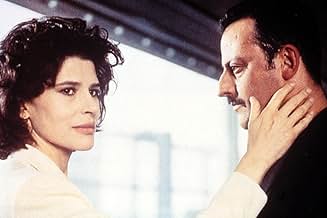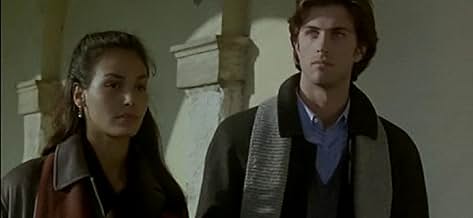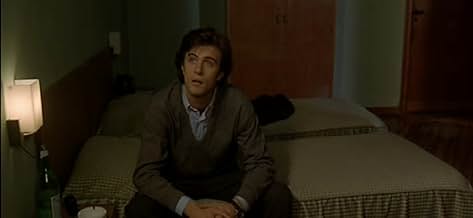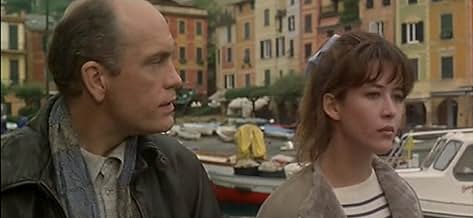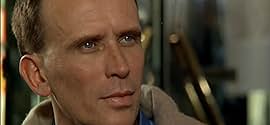CALIFICACIÓN DE IMDb
6.4/10
6.4 k
TU CALIFICACIÓN
Cuatro historias sobre relaciones cortas o largas entre hombres y mujeres en Italia y Francia.Cuatro historias sobre relaciones cortas o largas entre hombres y mujeres en Italia y Francia.Cuatro historias sobre relaciones cortas o largas entre hombres y mujeres en Italia y Francia.
- Dirección
- Guionistas
- Elenco
- Premios
- 3 premios ganados y 6 nominaciones en total
Kim Rossi Stuart
- Silvano
- (as Kim Rossi-Stuart)
Inés Sastre
- Carmen
- (as Ines Sastre)
Opiniones destacadas
For thirteen years after "Identification of a Woman" Michelangelo Antonioni was unable to make another film. However in 1995 he made a sudden return with "Beyond the Clouds" a collection of short stories linked by a film director (john Malkovich). Each film explores, with no real conviction or success the themes of desire,love and deception . At the time the film was hailed as a success, both Antonioni and wenders, who undoubtedly directed parts of the film, were praised. However on closer examination "beyond the Clouds" is far from a masterpiece although visually the images are beautiful all the stories are both implausible and without depth. The film fails in its attempts to explore complex human emotions. John Malkovich's character also fails to link the stories neatly and his ramblings are both pretentious and boring. The only story worthy of real praise is the final one starring Irene Jacob, always superb, who adds a touch of concision to an otherwise lost film. For those looking to explore the human emotions of love, desire, freedom , loss and loneliness would do far better to watch Krystof Kielslowski,s acomplished "Three colours" trilogy which cleary show the late Kielslowski to be far superior to Antonioni.
I was stunned by this film. I have been renting Antonioni's films/rediscovering them, and this film showed me the climax and fruits of his 50 years of directing. What an eye for setting, color, and detail! I have never seen such visual beauty and poetry filmed before. I had to stop after the first story and hold back the tears. Yes, beauty moves me, like it moved Keats to write Ode on a Grecian Urn. This movie is made for the mature, emotionally and intellectually, audience. Those hoping to see physical action and soap opera will be disappointed. I will have to see this film several times before I can truly appreciate it and judge it. This film should be required viewing for all cinematographers and directors.
Possibly a truly great film, on the order of Kurosawa's Dreams.
Possibly a truly great film, on the order of Kurosawa's Dreams.
The worst segment in this very uneven sketch film is the first, a silly tale of abandonment featuring pretty boy Kim Rossi Stuart and the Lancôme model Inés Sastre. It reeks of chic and product placement. The second episode, with a bored-looking Sophie Marceau is hardly better; we can't care if she stabbed her dad six, twelve or 528 times. Sophie does have a lovely body, however, and the boutique she works in is elegant.
The triangle story is next, with Peter Weller playing a bilingual rich man with a wife (Fanny Ardant, sensational) and a mistress (Chiara Caselli, OK). Fanny's big scene has her smashing a vase then chewing out her straying hubby. She manages to be drunk, angry and horny all at once: I have never seen her act with such power. Pity that the little sequel with Jean Reno meeting Fanny in the empty apartment isn't very effective.
The last segment with Irène Jacob, a pretty girl with a big secret, is a little gem, but it feels tacked-on, not really a part of the picture.
The triangle story is next, with Peter Weller playing a bilingual rich man with a wife (Fanny Ardant, sensational) and a mistress (Chiara Caselli, OK). Fanny's big scene has her smashing a vase then chewing out her straying hubby. She manages to be drunk, angry and horny all at once: I have never seen her act with such power. Pity that the little sequel with Jean Reno meeting Fanny in the empty apartment isn't very effective.
The last segment with Irène Jacob, a pretty girl with a big secret, is a little gem, but it feels tacked-on, not really a part of the picture.
This is a special film if you know the context. Antonioni, in his eighties, had been crippled by a stroke. Mute and half paralyzed, his friends -- who incidentally are the best the film world has -- arranged for him to 'direct' a last significant film. The idea is that he can conjure a story into being by just looking at it. So we have a film: about a director who conjures stories by simple observation. And the matter of the (four) stories is about how the visual imagination defines love.
The film emerges by giving us the tools to bring it into being through our own imagination. The result is pure movie-world: every person (except the director) is lovely in aspect or movement. Some of these women are ultralovely, and they exist in a dreamy misty world of sensual encounter. There is no nuance, no hint that anything exists but what we see; no desire is at work other than what we create.
I know of no other film that so successfully manipulates our own visual yearning to have us create the world we see. He understands something about not touching. No one understands Van Morrison visually like he does. Morrison's Celtic space music is predicated on precisely the same notion: the sensual touch that implies but doesn't physically touch.
Antonioni's redhead wife appears, appropriately as the shopkeeper and she also directs a lackluster 'making of' film that is on the DVD.
Ted's Evaluation -- 3 of 4: Worth watching.
The film emerges by giving us the tools to bring it into being through our own imagination. The result is pure movie-world: every person (except the director) is lovely in aspect or movement. Some of these women are ultralovely, and they exist in a dreamy misty world of sensual encounter. There is no nuance, no hint that anything exists but what we see; no desire is at work other than what we create.
I know of no other film that so successfully manipulates our own visual yearning to have us create the world we see. He understands something about not touching. No one understands Van Morrison visually like he does. Morrison's Celtic space music is predicated on precisely the same notion: the sensual touch that implies but doesn't physically touch.
Antonioni's redhead wife appears, appropriately as the shopkeeper and she also directs a lackluster 'making of' film that is on the DVD.
Ted's Evaluation -- 3 of 4: Worth watching.
Although I'm a big fan of his work, and specially his revolutionary masterpieces, I would say this film did not live up to my expectations regarding Antonioni's abilities. In one word, I found myself utterly bored. I could not bring myself to share any emotions with the characters (no matter how hard I tried) and finally gave up on watching it. Malkovich was poorly casted and instead of bringing warmth and real human emotions to the character, made it a drag and sometimes impossible to follow. There are no real links for this four short stories, and least of all Malkovich's ramblings and philosophical (attempts at best) remarks bordering on sunday sermons. If you want good quality film, better stick to the director's earlier works. Sorry!!!
¿Sabías que…?
- TriviaIn order to obtain the covering insurance needed to put the film into production, Michelangelo Antonioni (who was still recovering from a severely debilitating stroke) had to agree to have a secondary director on staff, ready to take over from him at any time. His choice, Wim Wenders, even provided the prologue and epilogue for the film.
- Versiones alternativasThere are two slightly different versions of the movie, the difference ocurring at the end. The US version of 'Beyond The Clouds' (Al di là delle nuvole, 1995) lacks the complete voice-over narration by John Malkovich's character at the end of the movie, from the moment he enters the hotel until the last image, before going to credits. The only line heard is: 'The director's profession is very peculiar...'; whereas the European cut of the movie contains a longer narration, also starting with the same line, but expanding until the last image before fading to credits. The voice-over talks about how the director's profession is to find images, only to discover another image beneath the previous one which is more faithful to the truth, and then another, and another, until you reach the one which equals reality, the one no one will ever see. Both versions are equally powerful in their own right, though it's interesting to note such a minor difference was made in the first place. Both versions are available, the US version was released in DVD, and the European version is available in VHS only.
- ConexionesFeatured in Fare un film è per me vivere (1995)
- Bandas sonorasUnknown Love
Written by Lucio Dalla and Robert Sidoli
Performed by Giuseppe D'Onghia (as Beppe Donghia) (piano) and Lucio Dalla (clarin)
Selecciones populares
Inicia sesión para calificar y agrega a la lista de videos para obtener recomendaciones personalizadas
- How long is Beyond the Clouds?Con tecnología de Alexa
Detalles
- Fecha de lanzamiento
- Países de origen
- Idiomas
- También se conoce como
- Beyond the Clouds
- Locaciones de filmación
- Productoras
- Ver más créditos de la compañía en IMDbPro
Taquilla
- Total en EE. UU. y Canadá
- USD 31,738
- Fin de semana de estreno en EE. UU. y Canadá
- USD 12,596
- 5 dic 1999
- Total a nivel mundial
- USD 31,738
- Tiempo de ejecución
- 1h 50min(110 min)
- Color
- Mezcla de sonido
- Relación de aspecto
- 1.66 : 1
Contribuir a esta página
Sugiere una edición o agrega el contenido que falta

